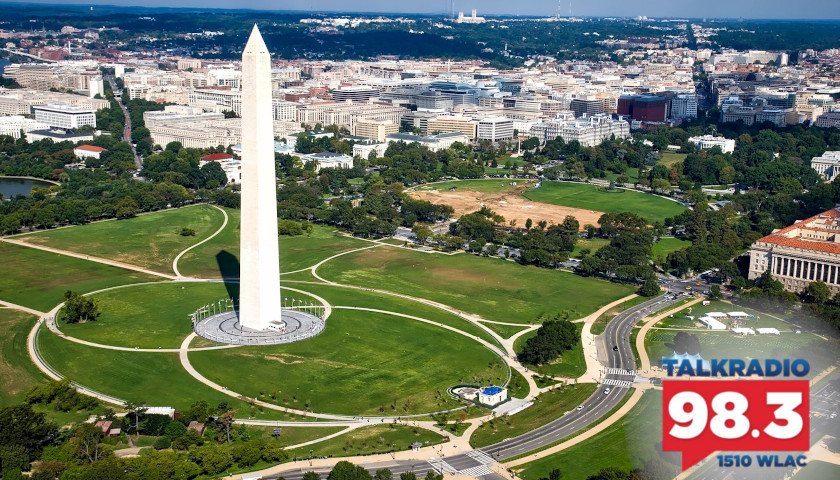Live from Music Row Friday morning on The Tennessee Star Report with Michael Patrick Leahy – broadcast on Nashville’s Talk Radio 98.3 and 1510 WLAC weekdays from 5:00 a.m. to 8:00 a.m. – host Leahy welcomed the original all-star panelist Crom Carmichael to the studio.
During the second hour, Carmichael compared mobsters during the 19th century to today’s politicians in Washington, D.C. by describing how the mob would use intimidation and force people into unions. He later described how there is a continuing pattern of legal criminality in D.C. that uses legislation to benefit itself at the expense of taxpayers.
Leahy: We’re joined in the studio by our good friend and the original all-star panelist Crom Carmichael. Crom, good morning.
Carmichael: Good morning Michael.
Leahy: Well, the beat goes on.
Carmichael: Yes.
Leahy: The clock keeps ticking.
Carmichael: Yes.
Leahy: We’re moving towards I guess a December 8. That’s Monday
Carmichael: That’s the first day.
Leahy: That’s the first date when the electors will be appointed. And then the Electoral College meets on December 14. Congress and convenes. I think January 3 or 4 to approve or reject the Electoral College votes. And then what January 20 we have an inauguration.
Carmichael: Yes.
Leahy: The clock is ticking. and the good guys in this case the supporters of Donald Trump. And looks to me like we are more likely than not on a path to have a stolen election. And as I’ve said many times stolen elections have consequences.
Carmichael: And we’ll see. I have been watching a TV program a documentary and it’s fascinating to kind of watch the history of how this particular institution evolved and how when things changed how it changed to go with the times. It’s a series of documentaries and it’s called Mobsters.
Leahy: (Chuckles) Okay.
Carmichael: And it really points out that the mob initially there were two major factions in the mobs. One was the Italians and the other was the Irish. And when the mob started they essentially made local merchants who are of their own kind pay for protection. The protection racket might have been loan-sharking. It was that type of thing and might have been prostitution.
Leahy: So, you know, just looking historically it seems to me that the Irish involvement in mobs and organized crime was documented in the movie Gangs of New York. They talked about what was going on in New York in the 1940s or so.
Carmichael: Well, I don’t know if I’m not really back that far. But the point that you’re making is that institutionally they were old. And they’ve been around for a long time. What they did that I’m really talking about and that is it was the mobs were pretty local. And they weren’t really all that. They were powerful within their neighborhoods. But that’s about it.
Leahy: There weren’t organized nationally.
Carmichael: There wasn’t the opportunity to become richer and until prohibition. And then when prohibition happened that’s kind of interesting because with prohibition you had the government. And I’m not saying the people who were in the teetotalers who are in favor of prohibition, I’m not saying that they were necessarily mobsters.
But it certainly helped the mobsters when the national government outlawed alcohol. Because then the only people who could provide alcohol or could but did provide alcohol were people who were involved in crime. By definition, it was a crime. And so so prohibition is what made the mobs huge. I mean, we’re talking hundreds of millions of dollars…
Leahy: Absolutely.
Carmichael: Of revenue and immense power. And with money what did the mobsters do? And we’re talking about in major cities. But we’re going to focus right now on New York and Chicago because those were the two cities where the mobs had the greatest influence. And what did they do? They bought off the politicians. They bought off the police.
Leahy: No shock in that. That’s what they do.
Carmichael: And I want to have this kind of be our discussion of the day a so to speak because this is really about human nature. And are all people bad? No. All people don’t have to be bad for a society to be incredibly corrupt. Only a relatively few.
Leahy: Five percent.
Carmichael: That would be very high. I mean that would be very very high and it just requires a few. and I would imagine and in the city of Chicago, the number of people who were fundamentally corrupt and I’m not talking about the people who were buying the whiskey. I’m talking about the people who were involved in criminal activity. Because you had the police you had the judges you had the politicians.
And what happened is Al Capone essentially dominated the crime scene in Chicago. There was an Irish group also and they fought back and forth. And you had the Valentine’s Day Massacre and all these different things. And the police essentially showed up to manage the crime scene. And so the mobsters fought it out amongst themselves.
Well, then when prohibition ended the mob no longer had their primary source of revenue which dwarfed everything else they did. So what did they do? What did they know about? Well, they understood the alcohol business and they understood the restaurant business to a point. And so what they did was with the blessing of the police the judges and the politicians, what they did was they organized the unions.
And the unions that were specially organized were in the restaurant business. So they organized the bartenders. they organized the waitresses with the support of the politicians. Essentially politicians forced these people who were in these businesses. If you want to be an employee, then you had to be a member of a union.
And then those standing those waitresses and bartenders and when the customer would come in they would then recommend or serve as their house drink a product that was manufactured or be produced by the mob. And so it was a very incestuous deal. Then that continued along. And then the mob got involved in other unions.
And so that’s why the private unions became extremely violent as part of their negotiating tactics because that’s how the mob handled its competition back when it was just the mob. And one of the other institutions they took over was Hollywood. They took over all the cameramen. They took over all the stagehands. They took over everybody and they essentially and we saw this in The Godfather by the way.
Leahy: By the way just as an aside, my greatest movie ever. The Godfather parts one and two.
Carmichael: Well, I actually liked part 3 more than I like the other two.
Leahy: By the way, there’s a been a recut version of it out there now, but Francis Ford Coppola says is much much better. I’ll give it to you for Christmas.
Carmichael: Good good. The whole Godfather?
Leahy: Part three.
Carmichael: Okay. Well, I’d love to see it. So at any rate, so then the mobs took over the unions and they and they elected a guy named George Brown who was the union president. and he got himself in trouble and went off to prison. And so you this back and forth between the unions and the politicians and the unions fighting with each other. And now I look at the country today. And by the way, what did the mobs do the simple way to describe it is the mobs went where the money was?
Leahy: Yeah.
Carmichael: Where’s the money now? Washington D.C. And so what you have is you now have a mobster mentality. And I would argue that Joe Biden is kind of the head of the first crime family that has been able to run Washington D.C.
Leahy: The Biden crime family.
Carmichael: Now I’m not saying Biden himself orchestrated all of it.
Leahy: He’s the head of the family.
Carmichael: It’s worse. It’s worse because when Trump came in Trump was Elliot Ness. Trump was one who was actually trying to clean up the swam. For example, back in the day of Al Capone in Chicago, the Italian mobs got a mayor elected who went after the Italians but didn’t go after the Irish. It’s because they were on the Italian mob’s payroll. And so politicians are very very much part of it. Politicians, judges, and police are all part of the mob.
Or were part of the mob. I don’t know that the police are as much involved in the mob today as they were. I’m not even sure that the judges are. The politicians, they certainly are. But the way it’s become now, it’s now legal crime. If that’s not an oxymoron. Because Washington D.C. has the highest per capita income and it’s almost double the second-highest.
Now, that means what they do fundamentally is they in Washington D.C. and the surroundings suck into their geographies immense amounts of money. It dwarfs prohibition. It actually dwarfs illicit drugs. It dwarfs everything. And then they spend that money or they borrow and force the taxpayers to be on the hook. And then they spend the money with their friends. Eisenhower talked about beware of the military-industrial complex. Under Trump, we saw that there was in fact a military-industrial complex.
Leahy: There is in fact.
Carmichael: Yes. There was when Trump took over and there is. And it’s an incestuous relationship where retired generals go on the boards of directors of defense contractors. And while it is necessary and proper for the federal government to provide for the national defense. Because we do live in a dangerous world. I’m going to stipulate that. But the rest of it is a giant racket. And now there are many industries. Big Pharma. Healthcare insurance.
Leahy: Following that pattern.
Carmichael: All of them are following that pattern of legal criminality by having legislation passed that benefits them at the expense of everyone.
Leahy: Exactly right.
Listen to the second hour here:
– – –
Tune in weekdays from 5:00 – 8:00 a.m. to the Tennessee Star Report with Michael Patrick Leahy on Talk Radio 98.3 FM WLAC 1510. Listen online at iHeart Radio.





